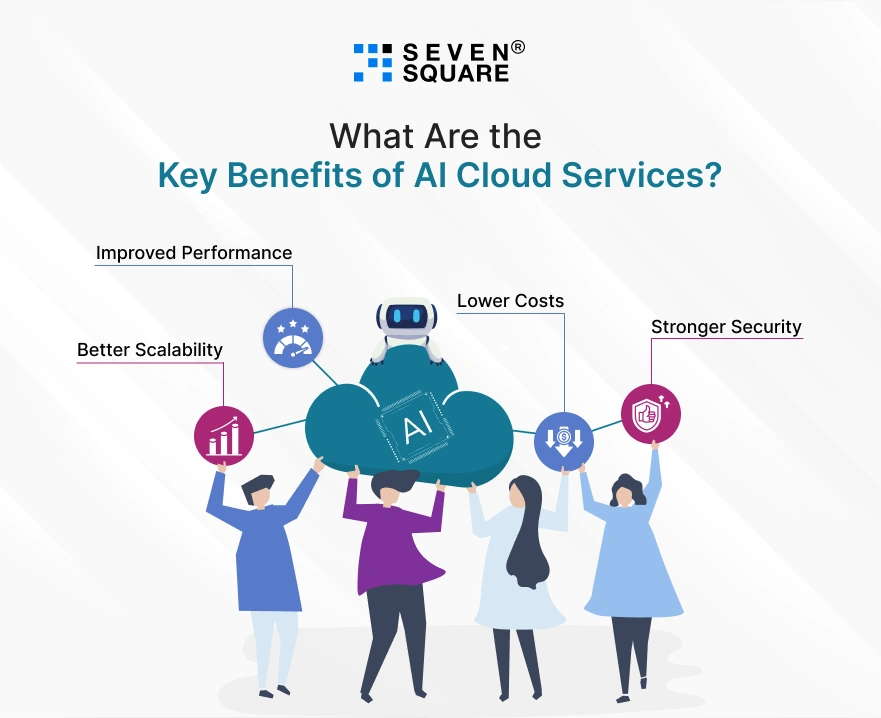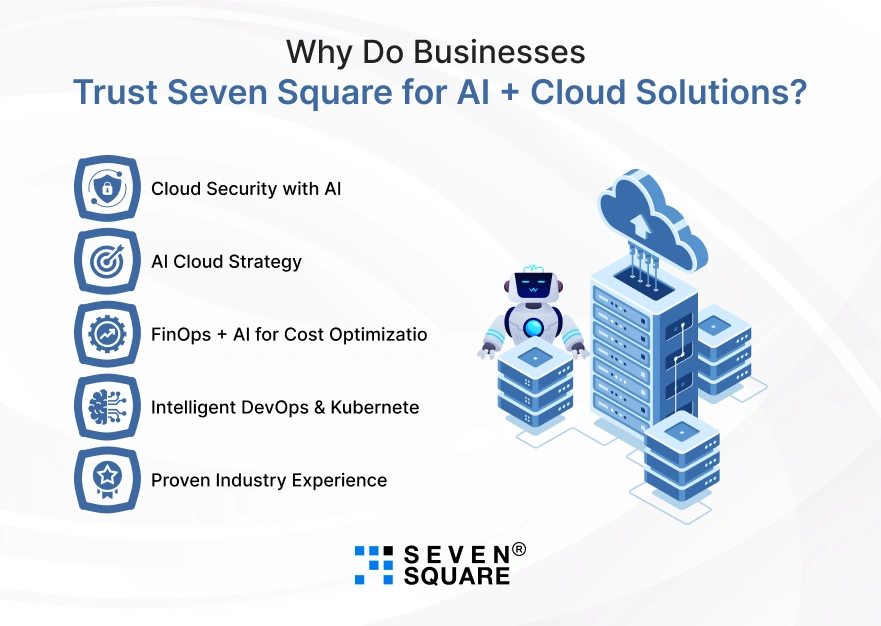The future of business belongs to those who adopt AI in cloud computing today.
Why? Because traditional cloud platforms are no longer enough in 2025.
Enterprises need more than storage and processing; they need a cloud that is intelligent, adaptive, and proactive.
An intelligent cloud combines the scalability of the cloud with the learning capabilities of AI.
Unlike static systems that respond only after demand spikes or security issues arise, intelligent clouds predict and adapt.
They forecast usage surges, detect security anomalies in real time, and optimize workloads automatically, all without human intervention.
Businesses across industries are using AI cloud services to get a competitive advantage.
At Seven Square, we help organizations transition into this new era by building AI cloud computing solutions that improve agility, reduce risks, and lower costs.
The intelligent cloud is not just a tool; it’s a strategic advantage.
The question isn’t whether to adopt AI in cloud, but it’s how fast you can use it to change your future.
What Is AI in Cloud Computing? (And Why Does It Matter Now?)
AI cloud computing means the integration of artificial intelligence into cloud platforms, making them more predictive, adaptive, and autonomous.
Consider the difference:
- Traditional cloud: Scales up when usage spikes are detected.
- AI cloud services: Predict demand in advance, provision resources proactively, and ensure uninterrupted performance.
At Seven Square, we see the future of cloud changing toward intelligent clouds that are no longer passive infrastructure but active business enablers.
AI in cloud computing is the difference between reacting to problems and preventing them.
For modern enterprises, AI in cloud computing is the foundation of digital resilience and growth in 2025 and beyond.
What Are the Key Benefits of AI Cloud Services?

The true power of AI is in how it changes the core benefits of cloud computing. At Seven Square, we help enterprises to maximize these advantages.
- Better Scalability: Intelligent clouds allow predictive autoscaling, where workloads scale up or down before demand spikes for smooth user experiences.
- Improved Performance: With AI workload orchestration and AIOps in cloud, systems automatically balance workloads and minimize downtime.
- Lower Costs: AI cloud cost optimization eliminates waste by right-sizing resources and enabling FinOps with AI.
- Stronger Security: From AI for cloud security to zero trust with AI, threats are identified and neutralized instantly.
These benefits go beyond efficiency. They allow businesses to:
- Innovate faster with AI cloud services.
- Reduce operational risks through AI threat detection in cloud.
- Maximize ROI by combining performance, security, and savings.
At Seven Square, our clients often see double-digit cost savings and performance improvements within months of adopting AI for cloud computing.
What is AI for Cloud Security & Compliance?
Cybersecurity threats are growing faster than ever, and traditional defenses can’t keep up.
That’s why at Seven Square, we focus on AI in cloud security to give enterprises a stronger shield.
- AI anomaly detection scans millions of logs, identifying suspicious activity instantly, something humans can’t match.
- Zero trust + AI ensures no user, device, or workload is trusted by default. This eliminates lateral attacks inside cloud environments.
- AI data governance follows real-time compliance with GDPR, HIPAA, and PII policies to ensure enterprises stay secure while scaling.
With AI compliance in cloud, businesses can automate what was once a manual, error-prone process.
At Seven Square, we’ve helped global enterprises adopt AI threat detection in cloud environments that respond faster than any human security team.
In 2025, cloud security is about intelligent & AI defense strategies.
What is Cloud Cost Optimization with AI? (FinOps + Beyond)
For many businesses, cloud costs feel like a runaway train. But with AI, it doesn’t have to be.
At Seven Square, we design FinOps with AI strategies that bring cost control back to the enterprise.
- Forecasting cloud spend: AI models predict usage spikes weeks in advance, giving finance teams accurate budgets.
- Dynamic storage: AI automatically moves data between hot, warm, and cold storage, ensuring businesses pay only for what they need.
- AI workload orchestration: Intelligent clouds allocate resources to the most cost-efficient nodes, eliminating wasted capacity.
Major providers like AWS and Azure already integrate AI cost optimization tools, but enterprises often fail to configure them effectively.
At Seven Square, we’ve helped clients cut costs by up to 35% using AI cloud cost optimization strategies.
Today, the winners are those who grow smartest with AI in cloud computing.
Learn Why Cloud-based Logistics is the Future of Cloud Operations.
What Are the Emerging Trends in AI + Cloud? (2025 and Beyond)
At Seven Square, we track AI and cloud computing trends 2025 closely because they show how enterprises will compete in the years ahead.
- Multi-cloud AI strategies: Businesses are moving away from a single cloud provider to adopt multi-cloud AI and hybrid cloud AI.
- LLMOps and RAG on cloud: As generative AI applications grow, enterprises are deploying LLMOps on cloud for lifecycle management of large language models.
- GPU cloud for AI training: Cloud providers are in a race to deliver affordable GPU cloud options. Businesses now benchmark latency, throughput, and pricing across platforms to run LLM training and inference cost-effectively.
- Serverless AI inference: Platforms like AWS Lambda and Google Cloud Functions allow serverless AI inference, scaling models dynamically without expensive infrastructure overhead.
These innovations show where the future of intelligent cloud is headed: toward smarter, more flexible, and cost-aware architectures.
We help enterprises stay ahead of these trends by designing AI strategies that scale not just for today but for the next decade of cloud evolution.
Learn more about the Best Odoo Cloud Hosting Providers.
Why Do Businesses Trust Seven Square for AI + Cloud Solutions?

Our team specializes in AI in cloud computing and intelligent cloud solutions that deliver measurable business impact.
- AI Cloud Strategy: We design and implement AI cloud services that improve scalability, performance, and compliance for enterprises of all sizes.
- Cloud Security with AI: From AI threat detection in cloud to zero trust frameworks, we secure mission-critical workloads with cutting-edge automation.
- FinOps + AI for Cost Optimization: Our expertise in cloud cost optimization with AI ensures businesses save more while getting maximum performance.
- Intelligent DevOps & Kubernetes: We implement AI in Kubernetes and AI for DevOps pipelines to achieve predictive autoscaling, observability, and faster delivery cycles.
- Proven Industry Experience: From generative AI in cloud solutions to enterprise-grade multi-cloud migrations, our projects have consistently delivered future-ready intelligent cloud transformations.
Ready to Adopt AI Cloud Computing? Contact Us Now!
What Are the Challenges & Risks of AI in Cloud Computing?
As transformative as AI in cloud computing is, it’s not without challenges. At Seven Square, we advise clients to prepare for these risks while adopting intelligent clouds:
- Data Privacy & Governance: With AI accessing sensitive information, AI data governance in cloud becomes critical.
- Compliance Risks: While AI compliance in cloud automates checks, misconfigurations can still expose businesses to regulatory penalties. Ensuring accurate AI-enabled compliance pipelines is important.
- Vendor Lock-in: Depending only upon one provider’s AI-powered cloud services can create long-term dependency. We recommend multi-cloud AI strategies to minimize risks.
- Security Vulnerabilities: While AI for cloud security improves defenses, over-reliance without human oversight may create blind spots. Combining zero trust with AI is a must.
- Ethical AI Risks: From bias in algorithms to lack of explainability, businesses must consider responsible AI deployment within cloud ecosystems.
Intelligent clouds are powerful, but success requires a strategy that combines AI innovation with governance, compliance, and cost control.
By addressing these risks early, enterprises can fully realize the benefits of the future of cloud without setbacks.
How Intelligent Clouds Are Changing the Future?
The next five years will mark the true rise of intelligent clouds. At Seven Square, we see the following shifts defining the future of cloud computing:
- Fully Autonomous Clouds: Clouds that self-heal, self-scale, and self-secure with minimal human intervention & powered by AIOps in cloud computing.
- Industry-Specific Intelligent Clouds: Vertical clouds with built-in compliance for healthcare (HIPAA), finance (PCI-DSS), and government (FedRAMP).
- Convergence of AI + Multi-cloud: Enterprises will design architectures that blend multi-cloud AI strategies with edge AI for maximum flexibility.
- Cost-Aware AI: Businesses will adopt AI cloud cost optimization and FinOps with AI practices as a standard, not a differentiator.
- Next-gen Developer Experience: With AI for DevOps pipelines, developers will move from manual code deployments to fully intelligent CI/CD systems with automated rollback and self-optimizing apps.
FAQs
- AI in cloud computing combines artificial intelligence with cloud infrastructure to deliver smarter, self-learning systems.
- In 2025, traditional clouds alone can’t handle evolving workloads, which makes intelligent clouds necessary.
- Key use cases include generative AI in cloud platforms, AI in Kubernetes autoscaling, and AI-based disaster recovery.
- These cloud AI use cases are changing DevOps and enterprise operations globally.
- Generative AI in cloud enables businesses to build, deploy, and scale AI-driven apps instantly.
- AWS, Azure, and GCP offer enterprise-ready APIs, helping in innovation and competitive differentiation across industries.
- With AI cloud services, enterprises gain adaptive scalability, AI cloud cost optimization, zero trust security, and regulatory compliance to make them ready for tomorrow’s digital challenges.